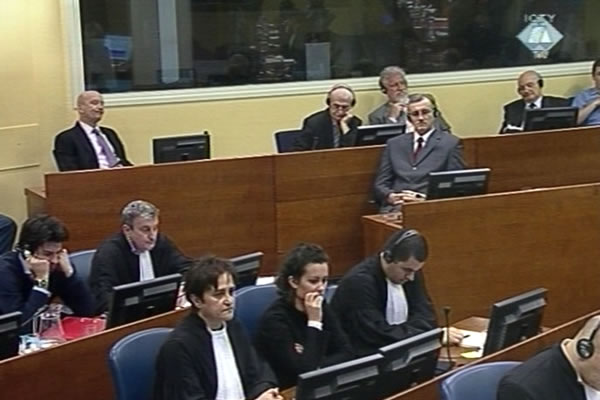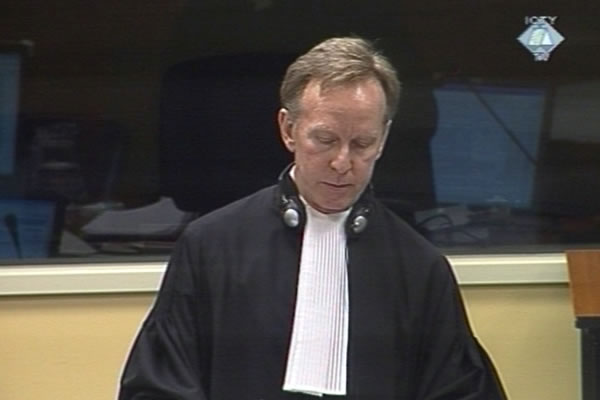Home
HOW THE ACCUSED CONTRIBUTED TO THE JOINT CRIMINAL ENTERPRISE
Continuing the closing arguments at the trial of the former Herceg Bosna leaders, the prosecution focused on the contributions of the accused to the joint criminal enterprise. According to the prosecution, Prlic controlled all the levers of power in the HVO, Stojic was responsible for HVO prisons and prison camps and Praljak’s ‘only interest was in winning the war’
 Jadranko Prlic, Milivoj Petkovic, Bruno Stojic, Slobodan Praljak, Valentin Coric i Berislav Pusic in the courtroom
Jadranko Prlic, Milivoj Petkovic, Bruno Stojic, Slobodan Praljak, Valentin Coric i Berislav Pusic in the courtroom The crimes in Herceg Bosna were widespread and systemic, prosecutor Kenneth Scott said as he continued his closing arguments at the trial of the former Bosnian Croat leaders. According to the prosecutor, those crimes were not isolated incidents perpetrated by out-of-control people ‘after a bad night’s sleep’. The crimes were systematic and widespread and followed a coherent pattern of behavior from October 1992 to the end of 1993 in the entire territory of Herceg Bosna.
The prosecutor then went on to describe the roles that each of the accused played in the joint criminal enterprise. From the moment he assumed power in August 1992, Jadranko Prlic transformed the HVO of the Croatian Community of Herceg Bosna into a fully operational government that controlled the work of the municipal HVOs and could revoke all their decisions if they didn’t comply with the Herceg Bosna policies. It was not Mate Boban – as the accused contend – but Prlic who exerted control ‘over all the levers of power in the HVO’. Together with the head of the department of defense Bruno Stojic, Prlic ‘controlled, funded, supplied, armed and fed the HVO troops’.
Stojic’s contribution to the joint criminal enterprise lies in the fact that he was the ‘most responsible person’ for the mobilization of Bosnian Croats, an ‘axis’ around whom everything related to the procurement of arms and logistics revolved. Stojic was also ‘responsible’ for prisons and prison camps in the Herceg Bosna territory.
According to the prosecutor, the accused ‘point their fingers at an empty place in the courtroom’ when they try to shift the blame on Mate Boban. Even if Boban had been an ‘important player’, this only means that he was one of the leaders of the same criminal enterprise, the prosecutor remarked, and then went on to quote from the statement of witness Davor Marijan, who said ‘from 1992 on, there are no documents confirming that Boban headed the Herceg Bosna armed forces’. The prosecution contends this shows that Boban transferred those powers on others. Recalling that the Presidency of the Croatian Community of Herceg Bosna didn’t meet between October 1992 and late August 1993, the prosecutor concluded that in that period, Prlic’s government was the ‘most powerful body of Herceg Bosna’
Speaking of General Slobodan Praljak’s role, prosecutor Douglas Stringer recalled that the objective of the joint criminal enterprise was to create an autonomous entity in BH whose borders were to coincide with those of the Banovina that existed in 1939, dominated by the Croats. As the prosecutor said, Praljak was fully aware of the fact that this vision called for the use of violence. This is illustrated by Praljak’s words at a meeting with Franko Tudjman in Zagreb on 26 September 1992: ‘without expulsions’, Croats would not be in the majority.
Praljak’s special contribution to the joint criminal enterprise is reflected in the fact that he played the role of ‘a liaison’ between the leaders in Croatia and in Herceg Bosna, the prosecutor contended. On 15 January 1993, Praljak personally brought from Zagreb the text of the ultimatum to the BH Army, demanding that they either withdraw or subordinate to the HVO in the three provinces Croats considered as their own, the prosecutor noted. In his evidence in his own defense, Praljak argued that Tudjman and Izetbegovic agreed on the contents of the ultimatum at their talks in Zagreb. However, minutes taken at the meeting showed that there was no such agreement.
The prosecutor went on to describe Praljak’s role in the conflict in Gornji Vakuf, ethnic cleansing and other crimes against civilians in the neighboring villages of Dusa, Hrasnica, Uzricje and Zdrimci in January 1993. The accused ‘turned a blind eye’ to the crimes of the HVO units because he was ‘only interested in winning the war’.
Photos
Linked Reports
- Case : Prlic et al.
- 2011-02-07 ARCHITECTS OF ‘GREATER CROATIA’
- 2010-12-17 PRLIC’S MOTION DISMISSED
- 2010-12-16 PRLIC: ‘IRRECONCILABLE DIFFERENCES’ AND ‘ANTIPATHY’ AMONG JUDGES
- 2011-02-09 PRALJAK’S GOODBYE TO HERCEG BOSNA
- 2011-02-10 PROSECUTION ASKS FOR 220 YEARS' IMPRISONMENT FOR HERCEG BOSNA LEADERS
- 2011-02-14 PRLIC’S DEFENSE: IT WAS PAINFUL TO LISTEN TO PROSECUTOR

